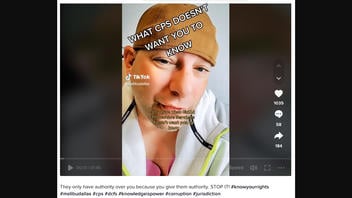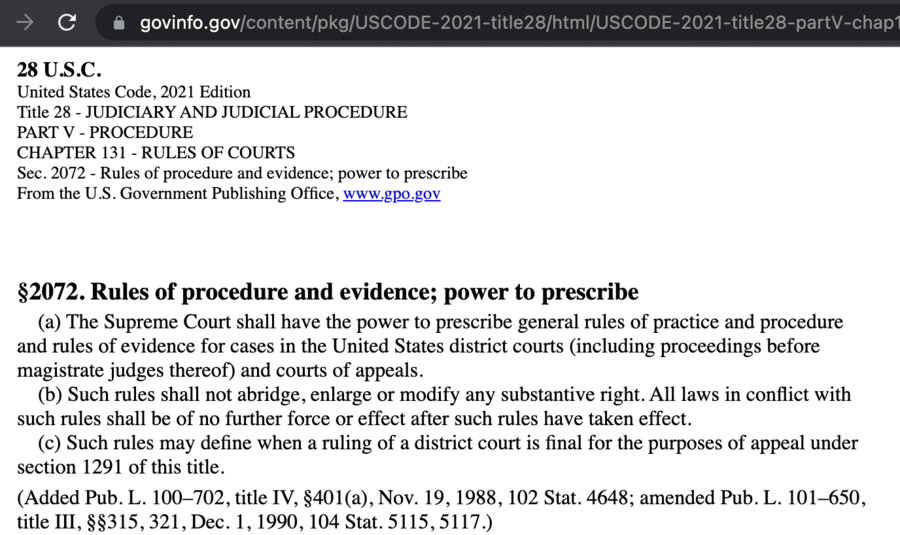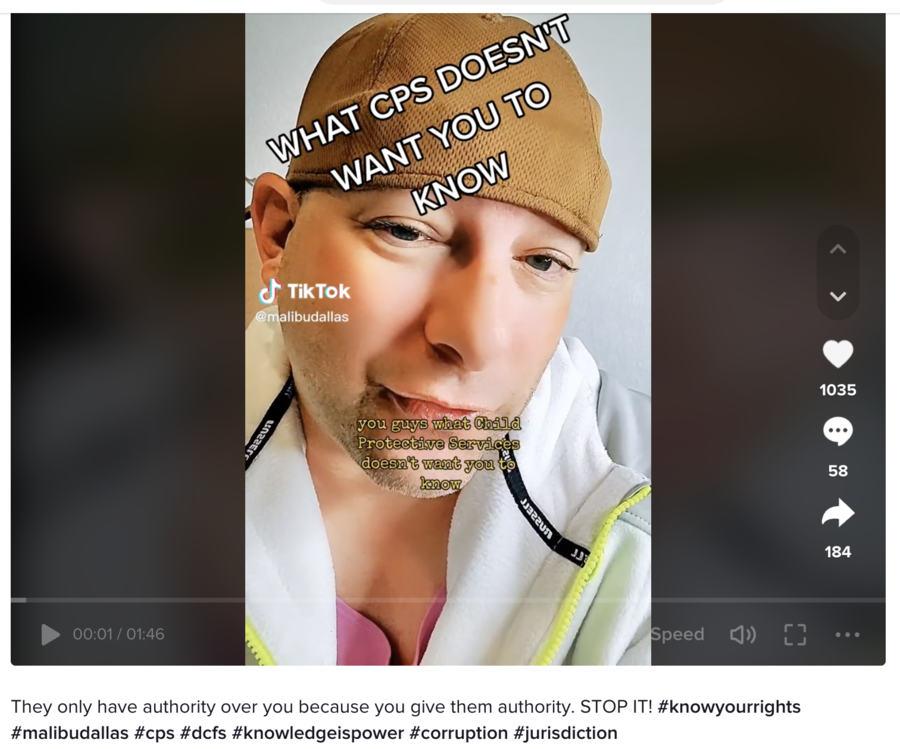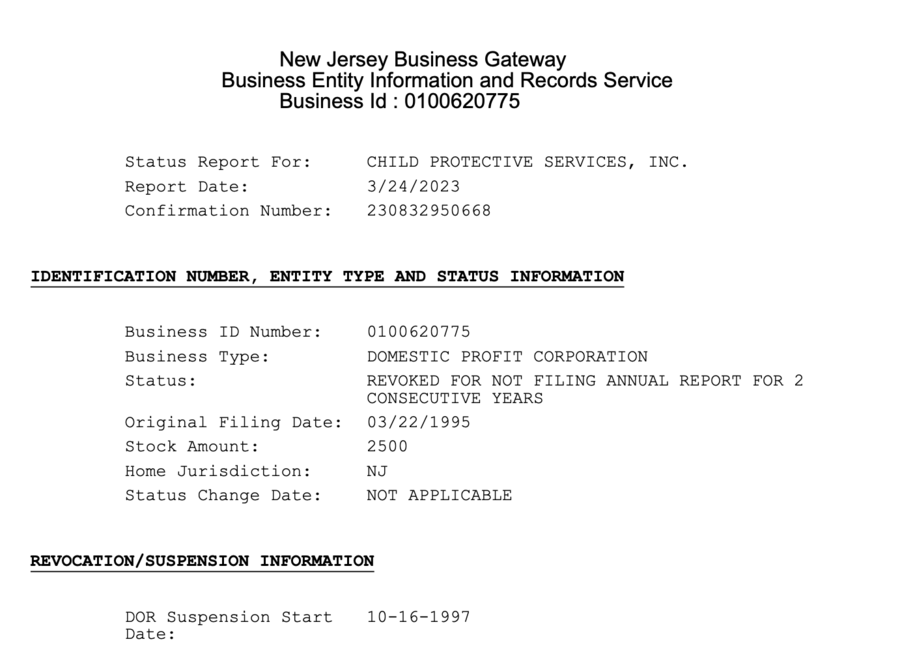
Is Child Protective Services a "for-profit corporation" that has no legal power to make demands or exercise authority "over you and your children"? No, that's not true: No public Child Protective Services (CPS) agency is registered in the U.S. as a for-profit corporation. Federal law gives states the authority to investigate reports about child abuse and neglect and they do not cede this function to private companies, a Columbia University law professor who specializes in this area told Lead Stories. Constitutional safeguards exist for Child Protective Services agencies, their nonprofit contractors and the parents and children who interact with them, the expert said.
The claim about Child Protective Services originated from a video (archived here) on TikTok on March 20, 2023. Speaking into the camera, its narrator said:
What Child Protective Services doesn't want you to know: Does Child Protective Services actually have jurisdiction over you and your children? And the answer is 'No!' You guys, Child Protective Services is a for-profit corporation. A for-profit corporation cannot have jurisdiction over a living soul; especially when they are violating your 4th, 5th and 6th amendments [of the U.S. Constitution].
The text description for the video asserted:
They only have authority over you because you give them authority. STOP IT! #knowyourrights #malibudallas #cps #dcfs #knowledgeispower #corruption #jurisdiction
Here is what the video looked like at the time of writing:
(Source: TikTok screenshot taken on Thu Mar 23 14:25:24 2023 UTC)
On March 9, 2023, the same host said in a video on TikTok that his livestream on the platform about CPS had been temporarily suspended for misinformation. In a different clip, published on September 23, 2022, he admitted, "I'm not a lawyer."
CPS is a broad term for state-level public agencies (which may have other names or be subdivisions of other agencies), whose job is to enforce the federal Child Abuse Prevention and Treatment Act. That law stipulates (page 41 of pdf):
... a State shall, at a minimum, have in place authority under State law to permit the child protective services system of the State to pursue any legal remedies, including the authority to initiate legal proceedings in a court of competent jurisdiction, to provide medical care or treatment for a child when such care or treatment is necessary to prevent or remedy serious harm to the 42 child, or to prevent the withholding of medically indicated treatment from children with life threatening conditions.
Contrary to the video's claim, "[c]hild protection agencies are state or local public agencies, not for profit corporations," Josh Gupta-Kagan, a Columbia University professor of law who specializes in child neglect and abuse law, emailed Lead Stories on March 23, 2023.
Lead Stories checked several local business registries (for example, here, here and here) and found several entities containing the words "child protective services" in their names.
The closest match -- "Child Protective Services, INC" -- was a company registered in Trenton, New Jersey, in 1995, and was a for-profit corporation. However, it only existed for two years and has been out of business for more than two decades:
(Source: New Jersey Department of the Treasury screenshot taken on Fri Mar 24 13:43:23 2023 UTC)
All other organizations with "Child Protective Services" in their names found by Lead Stories were nonprofits.
The powers of actual, government-run CPS agencies vary by state. Federal laws describing a framework for state regulations of CPS can be found here.
In New York, state law authorizes caseworkers to access relevant records, interview a minor without a court order or the consent of the parent or guardian and move a child into protective custody before a hearing in the state's Family Court. Families are not legally required to accept CPS input, but a caseworker can refer the matter to an assistant district attorney if he or she decides that court action is needed.
While certain systems, such as Texas, may subcontract "many functions" of a CPS to outside entities, "they are still government contractors and must act in accordance with law," Gupta-Kagan added in a follow-up email on March 24, 2023. Government contractors do not handle investigations, which appear to be the focus of the video's narrator, he commented.
Except for child sexual abuse cases, most CPS cases are civil proceedings, not criminal ones.
The Fourth Amendment of the U.S. Constitution, cited in the video, "absolutely applies to searches and seizures by child protection agencies," emphasized Gupta-Kagan, who also specializes in constitutional law.
Those agencies can get warrants or similar court orders if they have sufficient evidence (and they are able to enter a home in some emergency situations -- known as 'exigent circumstances' in 4th Amendment law), but parents do have the right to decline to permit them into their homes or otherwise decline to cooperate in an investigation. Whether it is wise to do that or not depends on the circumstances -- parents can and should seek legal counsel, and states should provide early defense -- lawyers for parents facing CPS investigations. This article does a good job explaining the 4th Amendment protections that apply.
By contrast, the Fifth and Sixth Amendments are "less applicable here," Gupta-Kagan wrote.
Due process, which the narrator mentions, is covered under the 14th Amendment. It gives parents "the right to care, custody, and control of their children and children have the right to live with their parents," Gupta-Kagan continued. "The state can only take children away from their parents if their parents are unfit."
The section of the United States Code cited in the video, 28 U.S.C. §2072(b), discusses the Supreme Court, not CPS or constitutional amendments. The U.S. Code serves as a catalogue of active U.S. law: 
(Source: Govinfo screenshot taken on Wed Mar 22 15:34:41 2023 UTC)
Recent investigations by Mother Jones and ProPublica, among other media organizations, have documented in detail the U.S. child care system's failures and shortcomings.
Additional Lead Stories fact checks of claims related to child welfare can be found here.














